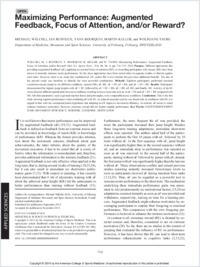Maximizing performance: augmented feedback, focus of attention, and/or reward?
- Wälchli, Michael Department of Medicine, Movement and Sport Sciences, University of Fribourg, Fribourg, Switzerland
- Ruffieux, Jan Department of Medicine, Movement and Sport Sciences, University of Fribourg, Fribourg, Switzerland
- Bourquin, Yann Department of Medicine, Movement and Sport Sciences, University of Fribourg, Fribourg, Switzerland
- Keller, Martin Department of Medicine, Movement and Sport Sciences, University of Fribourg, Fribourg, Switzerland
- Taube, Wolfgang Department of Medicine, Movement and Sport Sciences, University of Fribourg, Fribourg, Switzerland
-
2016
Published in:
- Medicine & Science in Sports & Exercise. - 2016, vol. 48, no. 4, p. 714–719
English
Different approaches like providing augmented feedback (aF), applying an external focus of attention (EF), or rewarding participants with money (RE) have been shown to instantly enhance motor performance. So far, these approaches have been tested either in separate studies or directly against each other. However, there is no study that combined aF, EF, and/or RE to test whether this provokes additional benefits. The aim of the present study was therefore to identify the most powerful combination.Methods: Eighteen participants performed maximal countermovement jumps in six different conditions: neutral (NE), aF, RE, aF + EF, aF + RE, and aF + EF + RE.Results: Participants demonstrated the highest jump heights with aF + EF, followed by aF + EF + RE, aF + RE, aF, RE, and finally, NE. Activity of the M. rectus femoris differed significantly between conditions resulting in lower muscular activity in aF + EF and aF + EF + RE compared with NE. All other parameters, such as ground reaction forces and joint angles, were comparable across conditions.Conclusions: This is the first study showing superior performance when combining aF with EF. As reduced muscular activity was found only in conditions with EF, it is argued in line with the constrained action hypothesis that adopting an EF improves movement efficiency. In contrast, aF seems to rather enhance (intrinsic) motivation. However, monetary reward did not further amplify performance.
- Faculty
- Faculté des sciences et de médecine
- Department
- Département de Médecine
- Language
-
- English
- Classification
- Biological sciences
- License
-
License undefined
- Identifiers
-
- RERO DOC 259545
- DOI 10.1249/MSS.0000000000000818
- Persistent URL
- https://folia.unifr.ch/unifr/documents/304845
Statistics
Document views: 148
File downloads:
- pdf: 193
